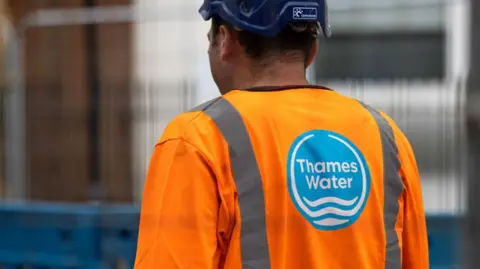Bidders line up for struggling Thames Water
 Getty Images
Getty ImagesThames Water has received multiple bids for the struggling business which has warned that it could run out of cash by next year.
Castle Water, a Scottish utility firm co-owned by Conservative Party treasurer Graham Edwards, is understood to have made an offer for Thames ahead of a deadline for potential investors this week.
Infrastructure investor Covalis, supported by French firm Suez, is also believed to have thrown its hat in the ring.
Thames is the UK's biggest water company and one in four people in the UK rely on the firm for their supply.
The ailing business is saddled with debts which, it admitted, will swell to nearly £18bn next March.
Customers are facing a steep rise in their water bills. In July, Thames told the industry regulator Ofwat that it wanted to increase annual bills by 23% between 2025 and 2030.
Since then, Thames has said it needed to raise bills by 53%.
Thames could run out of money as soon as the first quarter of 2025, which is why its creditors secured a loan of up to £3bn to be released in two tranches, the first £1.5bn of which could be released in February.
There is no shortage of potential investors in Thames.
People close to the process have told the BBC there are up to six interested parties, some of whom have emerged publicly, such as Castle Water and Covalis.
Other possible buyers include Brookfield Asset Management, the Canadian investment giant chaired by the former Bank of England governor Mark Carney, and Hong Kong's CKI which already owns a stake in Northumbrian Water.
All of these potential bids depend on two factors:
- How much pain are Thames' lenders prepared to take? How much of the £18bn debt will be written off?
- How much will Thames be allowed to charge customers over the next five years?
Both of these are currently up in the air. There will be some more clarity on whether bidders will remain interested when Ofwat announces its final determination on bills for the next five-year period on 19 December.
One thing we do know is that Thames needs at least £4bn in new equity - that is money that does not have to be paid back.
Both Castle Water and Covalis have plans to list Thames on the stock exchange.
Castle Water, Covalis and Thames Water all declined to comment.
When Thames Water was privatised in 1989 it had no debt. However, over the years it borrowed heavily.
A large proportion of that was added when Macquarie, an Australian infrastructure bank, owned Thames Water, reaching more than £10bn when the company was sold in 2017.
Thames is one of the most heavily indebted of England and Wales' water companies, and interest payments on more than half of its debt rise with inflation, which has been high in recent years, adding to the firm's woes.
